- Home
- Steve Vernon
Sinking Deeper Page 3
Sinking Deeper Read online
Page 3
“But I don’t want to leave,” I said.
“You’ll love Ottawa,” Mom assured me.
“I grew up in this town,” Dad said. “So did you. Roland should too.”
“What about my dory?” Warren wanted to know.
“Are you still here?” Mom asked, giving Warren a look.
Warren opened his mouth, thought better of it, and closed it up again. He turned and shuffled out of the police station, his furry sasquatch slippers leading the way.
“This town is dying,” Mom said. “There’s nothing here to see. There’s nothing here to do. There’s no future for a boy Roland’s age.”
“That’s fine talk for the mayor,” Granddad Angus said.
“I was a mom long before I was a mayor,” Mom said. “You wouldn’t have gotten into the kind of trouble you did tonight if you had been living in a city where there was more to do than just get into trouble.”
“I was having fun,” I said.
Except Mom wasn’t listening to me.
“I’m resigning from my position as mayor,” she said. “I’ll give proper notice at the council meeting next week.”
“Mayors can’t resign,” Dad said.
“Watch me,” Mom replied. “I’ve already taken a job in Ottawa.”
“But I don’t want to go to Ottawa,” I said.
Except nobody was listening to me.
“I’ll fight you in court,” Dad said, drawing the threat like a line in the dirt.
I had heard Mom and Dad fight a lot these last two years and even back before they thought of divorce, so I should have been used to this sort of arguing. Still, a fourteen-year-old kid doesn’t like to hear his parents going tug-of-war on him like he’s a bone caught between two stray dogs.
“You’ll lose,” Mom said to Dad. “Look at you. You’re keeping him locked in a jail cell, for heaven’s sake.”
Dad didn’t have any kind of answer to that one.
“Get packed and come home,” Mom said to me. “I’ll be expecting you for breakfast.”
Then she turned away and slammed the door behind her.
BANG—clack.
Dad got up and walked slowly to the freshly slammed door.
He took a deep breath—and then kicked it down.
BLAMMM! Right off the hinges.
Granddad Angus kicked his saw across the floor of the jail cell. It made a bow-wowing-tin-roof-explosion sort of sound—not half as noisy as kicking down a door, but with a lot more echo. The saw wobbled across the cell floor, fell with a clatter, and lay there like a set of giant robot dentures. I didn’t have anything to kick so I stood there feeling like someone had slammed a door in my face about ten thousand times.
My heart sank deeper than the bottom of the sea, sank about two miles deeper than that, drowned a little, and continued to sink on down. I just sat there, listening to the silence that hung on a long time after the door-slam and the door-kick and the saw-fall had died away.
And that was it. That’s the sound that scared me more than anything in my whole life. Not the cell lock clicking shut, not the kicked-down door, not even the howl of the caterwaul saw. That silence hanging on long after the thunder of Mom’s wordless goodbye was the single scariest sound I had ever heard.
Life had gone and changed.
Suddenly.
Chapter 5
Snake Secrets
There’s always a scene in those old Coyote and Road Runner cartoons where something heavy like an anvil or a piano or the CN Tower is falling towards that old Coyote’s head and he takes the time to open up a teeny-tiny umbrella and squint his eyes like he knows it’s going to hurt and there isn’t a thing he can do about escaping that hurt except hold up a teeny-tiny umbrella and wait—which was how I felt knowing that Ottawa was about to drop on my head. Only I didn’t even own an umbrella.
Dad unlocked the cell door.
“Go on home,” he said.
Granddad Angus picked up his saw, re-pocketed his bow, and walked through the kicked-down door, not saying a word.
Neither of them looked at each other.
Now who was moping?
Then Dad spoke to me.
“I guess I can’t hold you here,” was what he said, which, translated, means “Mom wins again.”
Mom always wins. That’s how she went from being a schoolteacher to being the mayor of Deeper Harbour. That’s what happened when she told Dad that they needed a divorce, just the same way she might have said that they needed a new can opener. Mom always wins—and as much as I love her because she is my mom, right then I also hated her just as much as a fourteen-year-old could hate anything in his life.
Feelings are a little like an ocean that way.
They are deep and can flow in a whole lot of directions.
“You probably ought to go home,” Dad told me. “This police station is apt to be a little drafty until I get this door patched up.”
I thought about that.
Actually, I had been thinking non-stop since Mom laid down her news.
I knew I ought to stay here and help Dad clean up the mess. I knew there was no way on earth that I wanted to see Mom right now, much less join her for breakfast, but I kept thinking about how she’d said there were no tourists and no future in Deeper Harbour. I kept thinking about how she’d said there was nothing to see here. I kept thinking about how Granddad Angus had said we’d given Deeper Harbour something to look at when we wrecked the dory and I kept thinking about Warren’s radioactive mutant vein and I kept thinking about how that caber looked, poking out of the boat.
I kept thinking there had to be something I could do about this mess—but “Okay, Dad,” was all I said.
And then I ran for home, following the distant compass of my mother’s footsteps, which had vanished down the same street that Granddad Angus and I had run along just an hour earlier with a clothesline-pole caber. I ran, feeling the spring of the dirt that slept beneath the pavement of the street. I ran, allowing my sneakered feet to beat the street as if somehow I could run all of my problems to death.
I ran, full out, all go, with no stop, kicking one foot out after the other, following a trail that only my toes seemed to know—hoping that somewhere between the right-now of my dad and the we’ll-see of my mother, I would run myself into some sort of a plan.
And halfway home I tripped over an idea.
I was standing in the halo of the hardware store sodium lamp. A big fat garter snake slithered out from under a bush and slid directly in front of my feet. You see a lot of those snakes that time of the year so it didn’t scare me. I stopped and watched it move towards a puddle. I think the snake believed that if it could get into the water it would be safe from the dangerous, looming, fourteen-year-old predator that was casting a sodium lamp shadow over it—namely, me.
I watched the snake slither through the puddle like a tiny escalator set on its side, its flat, wedge-shaped head poking up like a periscope. The snake’s green and grey and yellow scales rippled and bulged and then it turned and looked up at me as if it was deciding whether to eat me or greet me.
It stuck its tongue out at me at exactly the moment that the idea that had been sneaking around the basement of my imagination jumped up and smacked me directly between the eyes.
I knew just exactly what I needed to do.
Chapter 6
Sea Monster Seeds
Mom sat at the kitchen table like a stack of unavoidable homework.
“You ought to eat,” she told me.
I peanut-butter-and-jammed some bread, because I did not want to wait for the toast to pop. Mom said a few more things. I nodded back a few times, like I was really listening, yawning between every nod until Mom finally told me that I’d better go to my bedroom and have a nap—which was exactly what I’d planned.
&
nbsp; Only I wasn’t going to sleep.
I sat on my bed and leaned back with my laptop balanced on my legs, enjoying the perfect groove I’d worn into the mattress over the years. I wondered if I could multiply the years since cribdom and subtract the nights I’d spent out in my tent in the summer and the few times I’d visited our Uncle Wilfred’s place to figure out just how much time I’d spent right here—but who in their right mind wants to do math this early in the morning?
I wondered if I would be allowed to take my bed to Ottawa with me.
How much stuff could I bring?
Would I need to get used to sleeping in a brand-new bed?
It didn’t matter. I needed to stop feeling sorry for myself. None of that mattered now that I had a plan.
I started out by searching “sea monster” on Google, which brought me about 14,600,000 hits, which wasn’t quite a kajillion but close enough. This was going to be harder than I’d thought. So I tried “Canadian sea monster,” which narrowed my hunt down to 250,000 results.
I spent an hour rooting my way through the deep heaps of sea monster information I’d discovered. It turned out that Canada was home to an awful lot of monsters: Ogopogo and the Cadborosaurus in British Columbia; another Ogopogo in Alberta; something called Agopogo in Saskatchewan; a Manipogo in Manitoba; Champ in Lake Champlain, Quebec; and Igopogo in Lake Simcoe, Ontario. Further east in New Brunswick was Gougou in Chaleur Bay and Old Ned in Lake Utopia; Okiepogo in O’Keefe Lake, Prince Edward Island; and Cressie in Newfoundland. There were sea monster sightings all around Nova Scotia, including lake lizards in Cranberry Lake and Lake Ainslie, and even monsters spotted right in the middle of Halifax Harbour.
It seemed as if the waters out there were as thick as chowder when it came to sea monsters.
I started taking notes.
Sure, I know that sounds way too much like homework, but I’d decided that I was going to be organized about this. So I made a list of the common elements of every sea monster sighting I’d found.
I decided to send an email to every sea monster organization and scientific expert I could find to let them know that something huge was happening in Deeper Harbour. Sooner or later, if I talked to enough people, somebody would listen. There’d be stories in the newspaper and on TV. The Deeper Harbour sea monster would get everyone talking.
If there were a sea monster in Deeper Harbour the tourists would come back. Once the tourists came back, the money would come back. Stores would open up and this town would have a real future. Maybe there would be television specials and maybe even an action movie and Mom would say something like, “Hey, why did I ever think we needed to move to Ottawa when there is so much happening right here in Deeper Harbour?”
Yeah, right.
It sounded good in the way that ideas a fourteen-year-old’s plan-making muscles come up with can, but who was I kidding? No one would listen to a kid like me.
Still, I had to do something and this was better than doing nothing at all.
It was like planting seeds in a garden. You never know which one will grow.
I added “organizations” to my search and started getting the kind of results I was looking for. I made a list of email addresses for the organizations I found.
I set up an anonymous email address.
I drafted a letter.
I’m telling you, I was organized.
And then I decided exactly who I wanted to email first. It came to me like a thunderbolt to Frankenstein’s lightning-attracting neck bolts. I needed to notify the single greatest Canadian scientist that ever lived.
I found his email address on his website.
This would be perfect.
From: [email protected]
To: David Suzuki
DEAR DAVID SUZUKI,
EARLY LAST NIGHT MY FRIENDS AND I SAW A HORRIBLE SEA MONSTER RIGHT HERE IN THE WATERS OF DEEPER HARBOUR, NOVA SCOTIA. IT HAD A LONG PLESIOSAURUS-LIKE NECK AND A BRIGHT RED MANE AND IT HAD TEETH AND EYES THAT GLOWED IN THE DARK. IT MADE A HORRIBLE SOUND LIKE IT WAS ANGRY OR MAYBE IT WAS LONELY. I DON’T KNOW IF ITS NAME ENDED IN POGO OR NOT BUT I AM WRITING TO YOU IN HOPES THAT YOU WILL COME AND DISCOVER THIS SEA MONSTER. PLEASE SEND THIS EMAIL TO AS MANY PEOPLE AS YOU KNOW.
I BELIEVE IN YOU.
SIGNED: ANONYMOUS
P.S. THE SEA MONSTER SMELLED FUNNY TOO.
All right, I never said I was any kind of a writer. But I thought I’d hit the necessary details. I thought the phrase, “I believe in you” was a pretty good guilt-trip mechanism, and believe you me, nobody understands guilt trips like the fourteen-year-old child of divorcing parents.
I added the GPS coordinates for Deeper Harbour, a map, and a picture of a fishing boat from a Nova Scotia tourism website, then sent my message off. My next step was to send a copy of the email to every monster-hunting organization I had found.
My figuring was pretty simple. If I sent twenty emails to twenty organizations, and they forwarded my email to twenty people, sooner or later my email would have reached every single potential tourist in Canada.
Sending the emails was easy once I fell into a routine, just cut and paste and send, over and over. I wondered if I could get a job doing this sort of thing. Kind of like a publicist for sea serpents and wood beasts across the country.
I wondered if Bigfoot had ever thought of hiring a personal public relations consultant.
I sent a few more messages before erasing the history on my computer just in case Mom got into one of her snooping moods. I closed the laptop and I decided that after being up for most of the night throwing cabers and sinking dories, a half-hour nap would do me just fine.
Three hours later, I was still snoring softly with drool running down my chin when my first reply came winging back to me.
Chapter 7
A Chapter for Skipping
The ten-o’clock-in-the-morning sunshine pushed aside my bedroom blinds, pried my eyelids open, and slapped me awake. I rolled out of bed and checked my email. I danced a little dance of yippee-yahoo when I saw that someone had replied to one of my sea monster messages. I read it, tossed my laptop into my backpack, and got going.
I hopped downstairs for my second breakfast of the day. I greased toaster waffles in butter, drowned them in syrup, and forked them down fast. I swallowed a bucket and a half of cold, white milk, thinking chocolate thoughts, and even managed a fake, cheery “Hi Mom,” before running out the door. I headed for the harbour.
And so, I guess, had everyone else.
It looked like half of Deeper Harbour was standing on the rickety old wharf staring at the damage we’d done. I expected the other half of Deeper Harbour’s population was checking out Molly’s desecrated pumpkin patch.
I found Dulsie and Granddad Angus standing in the shadow of Warren’s boat shed. Dulsie was wearing a battered straw hat that looked too beat up for any self-respecting scarecrow to be caught dead wearing it. A scrap of fishing net hung off the hat and over her face.
“What’s the net for?” I asked.
“It’s a veil,” Dulsie explained. “I’m in mourning. Don’t you see the tears?”
I looked closer and saw that she had painted big black tears down her cheeks.
“What are you mourning for?” I asked.
“This town,” Dulsie said. “My dad told me what your mom said when he got home from the police station.”
“What about it?” I asked.
“Your mom is right,” Dulsie said. “This town is dying.”
No, it isn’t, I thought. I had the answer to all of our troubles, only I didn’t want to tell her just yet so I bent down and picked up a stone and skipped it across the water.
Skip—skip—skip—sploosh.
Dulsie bent down and picked up a stone of her own—a nice flat spinner. She sidearmed it with just the right amount of flick at
the end of her throw. I wouldn’t want to admit it, but she threw a whole better than I did.
Skip—skip—skip—skip—skip—sploosh.
“That’s a pretty good throw,” Granddad Angus said.
“Ha,” somebody said from behind us, “it runs in the family.”
I turned around. It was Warren, with a stone of his own in his hand. For a moment, I was afraid he was going to throw it at me.
“You’re out awfully early,” he said to Dulsie.
“I couldn’t sleep,” she said.
“Your mom was that way,” Warren said. “You are just the same as she was.”
Dulsie’s mom had died in a car wreck eight years ago, when Dulsie was seven years old. She says it doesn’t bother her anymore, but I kind of wonder about that. There is some paint that will never wash off.
“Am not,” Dulsie said and Warren let the argument lie.
He took two steps forward and skipped his own stone out across the water.
Skip—skip—skip—skip—skip—skip—skip—clunk.
Whoops.
The clunk was the sound of Warren’s stone smacking against the bottom of his caber-impaled dory. I expected him to get angry at the reminder of how Granddad and I had damaged his boat, but Warren just laughed.
“I guess it’s a good thing that dory was wrecked,” he said. “I’ve been hanging on to the hope that our tourism would return, but let’s face it—the mayor is right.”
I was getting sick and tired of hearing how right Mom was. She had taken the wind out of Warren’s sails, just that easily, and that bugged me. It didn’t help that I was afraid that maybe she was right.
“I think I’m just going to leave that dory floating out there,” Warren went on. “Kind of like a tombstone to a town that went and died.”
Enough was enough.
“Want to bet?” I said. “This town isn’t ready to die just yet.”
“I’ve got two words for you,” Warren said. “Im—possible.”

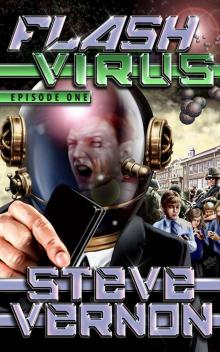 Flash Virus: Episode One
Flash Virus: Episode One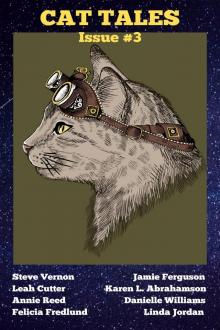 Cat Tales Issue #3
Cat Tales Issue #3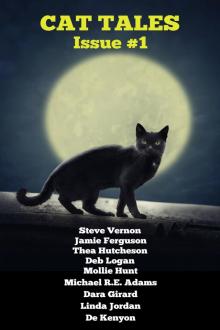 Cat Tales Issue #1
Cat Tales Issue #1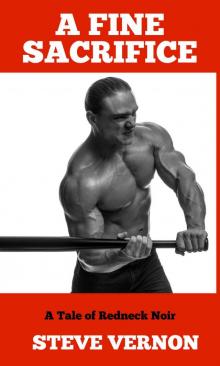 A Fine Sacrifice
A Fine Sacrifice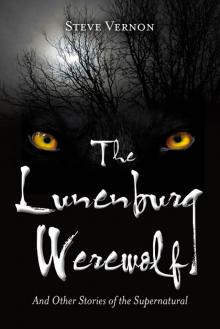 The Lunenburg Werewolf
The Lunenburg Werewolf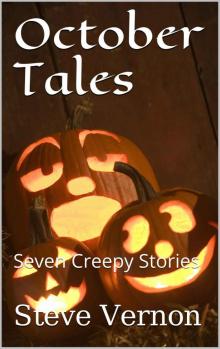 October Tales: Seven Creepy Stories (Stories to SERIOUSLY Creep You Out Book 1)
October Tales: Seven Creepy Stories (Stories to SERIOUSLY Creep You Out Book 1)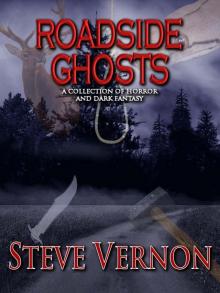 Roadside Ghosts: A Collection of Horror and Dark Fantasy (Stories to SERIOUSLY Creep You Out Book 3)
Roadside Ghosts: A Collection of Horror and Dark Fantasy (Stories to SERIOUSLY Creep You Out Book 3)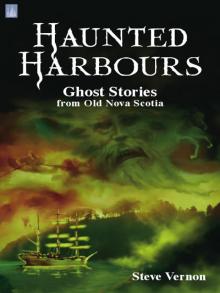 Haunted Harbours
Haunted Harbours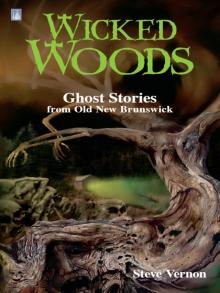 Wicked Woods
Wicked Woods Two Fisted Nasty: A Novella and Three Short Stories (Stories to SERIOUSLY Creep You Out Book 2)
Two Fisted Nasty: A Novella and Three Short Stories (Stories to SERIOUSLY Creep You Out Book 2)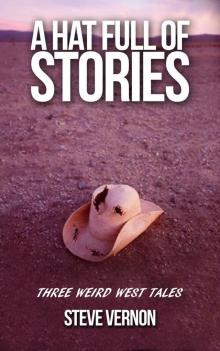 A Hat Full of Stories: Three Weird West Tales (Stories to SERIOUSLY Creep You Out Book 9)
A Hat Full of Stories: Three Weird West Tales (Stories to SERIOUSLY Creep You Out Book 9)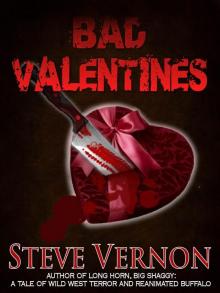 Bad Valentines: three twisted love stories (Stories To SERIOUSLY Creep You Out Book 7)
Bad Valentines: three twisted love stories (Stories To SERIOUSLY Creep You Out Book 7)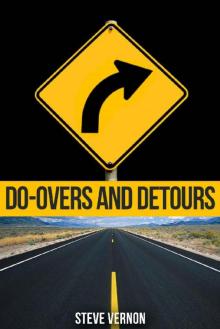 Do-Overs and Detours - Eighteen Eerie Tales (Stories to SERIOUSLY Creep You Out Book 4)
Do-Overs and Detours - Eighteen Eerie Tales (Stories to SERIOUSLY Creep You Out Book 4)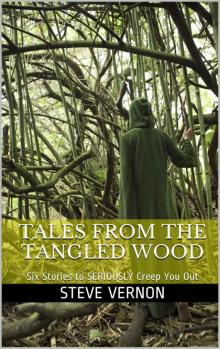 Tales From The Tangled Wood: Six Stories to SERIOUSLY Creep You Out
Tales From The Tangled Wood: Six Stories to SERIOUSLY Creep You Out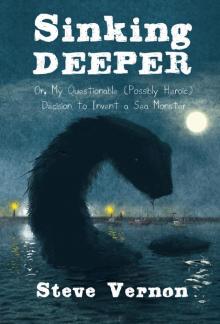 Sinking Deeper
Sinking Deeper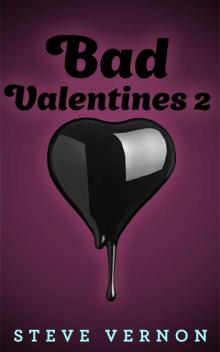 Bad Valentines 2: Six Twisted Love Stories (Stories to SERIOUSLY Creep You Out Book 5)
Bad Valentines 2: Six Twisted Love Stories (Stories to SERIOUSLY Creep You Out Book 5)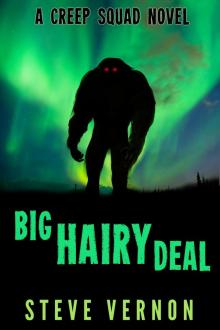 Big Hairy Deal
Big Hairy Deal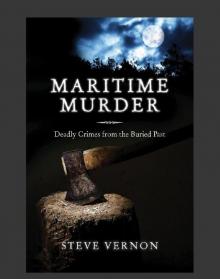 Maritime Murder
Maritime Murder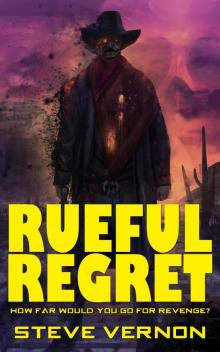 Rueful Regret
Rueful Regret